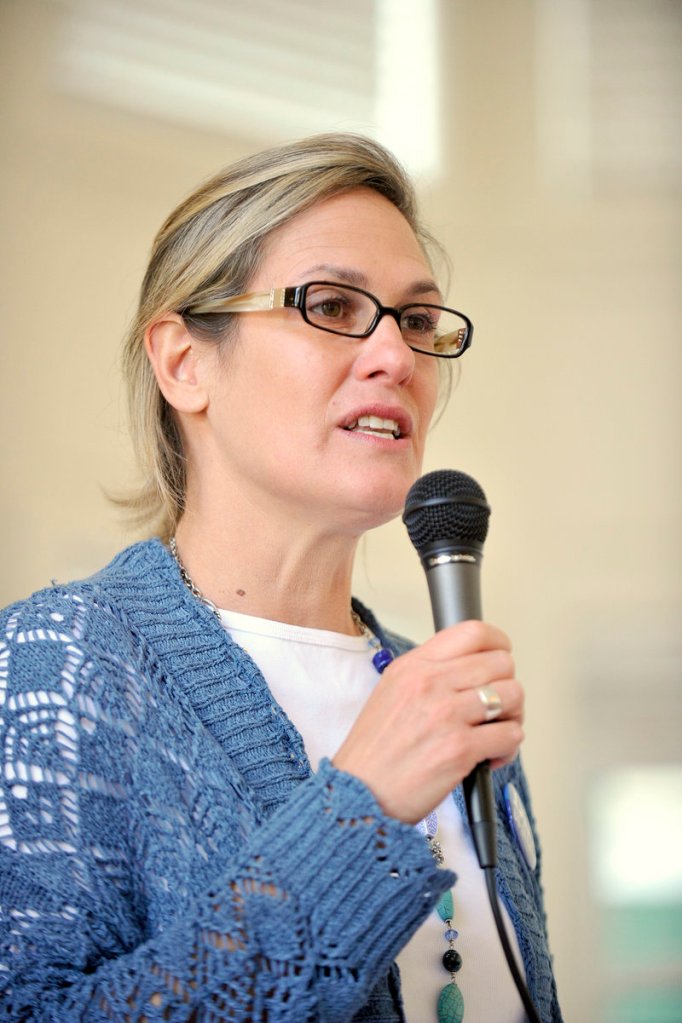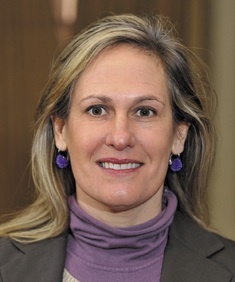CAPE ELIZABETH — The solution to the gridlock tying up Washington seems fairly clear to state Sen. Cynthia Dill, D-Cape Elizabeth.
Dill, who is seeking the Democratic nomination for the U.S. Senate, is an unabashed liberal who believes that to break the logjam and advance its agenda, her party needs to stand up for its values.
“I don’t think that being a progressive Democrat means that you’re partisan,” she said. “The Republican Party is the party that’s dysfunctional and causing problems.”
Being a progressive Democrat, to Dill, means you’re willing to make waves.
When her own party’s president came to town earlier this spring, Dill held a “bake sale” in Portland across the street from the Obama fundraising dinner with big donors, offering a bag of cookies for $25,000. Her point, she said, was to demonstrate against campaign finance laws that give the wealthy easy access to politicians, while “people of average means are priced out of democracy.”
But it did cast the fundraising by her party’s leader in a negative light.
Dill also has been a frequent thorn in the side of Maine Gov. Paul LePage, a Republican.
Last year she sponsored a bill barring state employees from hiring relatives after LePage hired his daughter for a position in the governor’s office. Dill also started an online petition calling for Mainers to be allowed to recall elected officials. It was perceived as an effort to initiate a recall of LePage, who was elected with 38 percent of the vote.
Such tactics put a target on Dill’s back. The GOP hoped to defeat her last year in a special election for the state Senate. During the campaign, the head of the Maine Republican Party, Charlie Webster, called Dill perhaps the most liberal lawmaker in Augusta.
Still, Dill won easily – helped, no doubt, by an opponent who was weakened by a slew of personal and professional financial problems.
Dill’s entry into politics was fueled by her partisan passion.
She’s a lawyer, originally working on commercial transactions. But she was energized by a couple of police harassment civil rights cases she took on and won.
Moving to Cape Elizabeth for the good schools, she pegged one member of the town council as a Republican – even though the races are non-partisan – and ran against him, losing by a handful of votes. She tried again the next year and won.
Then she ran for an open House legislative seat in 2006 and won.
Her top achievement during three terms in the House, Dill said, was helping to expand broadband Internet access in the state through the “three-ring binder” approach.
In 2011, state Sen. Larry Bliss, D-South Portland, resigned to take a job out of state, setting up a special election. Dill jumped in and won easily against Louis B. Maietta Jr., whose family had deep ties to South Portland, home to a majority of votes in District 7, which also covers Cape Elizabeth and part of Scarborough.
Dill carried South Portland by a wide margin on her way to winning the seat. Maietta was hampered by unpaid property taxes, liens and an unpaid judgment of more than $800,000 stemming from a lawsuit.
Despite the weak opponent, Dill’s win was seen as carrying a message: The Republican tide of 2010, which gave the GOP control of both houses of the Legislature and propelled LePage to the governorship, had been reversed.
In the district that Dill won, the incumbent Democrat in 2010 barely held onto the seat in a race that required a recount. The easy win by one of LePage’s top detractors suggested Democrats might gain back legislative seats this year.
But rather than stay in the Maine Senate and seek a full term, Dill set her sights on the U.S. Senate.
She entered the race earlier this year, before Sen. Olympia Snowe’s startling announcement that she would leave at the end of her term and forgo what most observers considered a relatively easy re-election.
Dill said she was concerned that Snowe, who was perceived as probably the most moderate Republican in the Senate, was trying to placate the conservative wing of her party by supporting continuation of the Bush tax cuts and opposing Obama’s health care reform.
“I did feel that she was moving to the right,” Dill said. “She wasn’t making choices that reflected Maine values.”
Dill was at the State House in Augusta when she learned Snowe wouldn’t run for re-election. She was elated – briefly.
“I ran out to the car and my heart was pounding,” she said, “and it lasted probably less than an hour before reality hit that now everyone would be getting in.”
In – and out. Both of Maine’s Democratic representatives in Washington seemed like they were going to run for the Senate seat. Former Democratic Gov. John Baldacci took out nominating papers. So Dill and others considered running for the House of Representatives instead.
Then former Gov. Angus King said he would run for Senate as an independent, and almost everyone went back to their original positions.
Of the four candidates in the Democratic Senate primary, Dill has seemed to be the one most eager to take on King, who leads in early opinion polls.
“It was pretty opportunistic on his part,” Dill said of King’s decision to enter the race. But observers think he’s well-positioned to win.
Former state Sen. Ethan Strimling has lamented that King’s entry leaves his party – Democrats – facing the possibility of finishing third again for a statewide office: state Sen. Libby Mitchell, the Democratic candidate, finished a distant third in the 2010 gubernatorial race behind LePage and independent Eliot Cutler.
Asked to handicap the Democratic primary, Colby College political scientist L. Sandy Maisel said, “My general feeling is, it doesn’t matter.”
None of the candidates in either party, he said, “has the ability to be taken seriously by the public to seriously contest Gov. King.”
Outside of their home areas, Maisel said, none of the candidates, including Dill, has done much to raise their visibility.
“What we know about her as a candidate is virtually nothing,” and that’s largely true of her challengers for the nomination, he said.
But Dill argues that will change if she’s the nominee, because she will be willing to challenge King.
She noted that some of his decisions as governor, such as vetoing an increase in the minimum wage, will make it hard for King to appeal to liberals.
And, like many of the Republican candidates, she’s critical of King for saying he doesn’t know which party he will caucus with – the key to getting committee assignments in the Senate – or that he may not caucus with either.
“I don’t tolerate mind games,” Dill said. “The fact that Angus King is basing his entire campaign on not telling voters where he stands means it’s going to be a very interesting campaign.”
Staff Writer Edward D. Murphy can be contacted at 791-6465 or at: emurphy@pressherald.com
Send questions/comments to the editors.





Comments are no longer available on this story